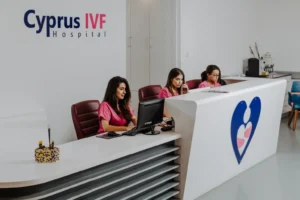During early 2021, at the age of 40, I travelled with my husband, Russ to Prague for IVF. We’d been trying to naturally conceive a second child for two and a half years with no success. My existing condition – uterine adhesions had been rectified via private treatment during 2020. Due to our ages (40 and 44) and the fact that we’d already endured a long fertility struggle, we felt that it was important to not waste any more time and to get on with things. We researched our IVF options both in the UK and abroad. We opted to go abroad for IVF. Why? Well, I explain that below plus crucially I share the 7 vital things I learnt along the way.
1. Take time to think about what’s right for YOU and your partner and consider getting some expert support
I wouldn’t describe myself as a particularly decisive person. If I’m presented with endless options, I often feel overwhelmed. This was how I felt when my husband and I first started researching IVF abroad. Fortunately for us, we decided early-on to get help from Your IVF Abroad – an agency where you can pay to be matched to a safe European IVF clinic according to your needs and who supported us practically and emotionally through our treatment. Whilst this route felt right for us (we needed the expert guidance, to know things were safe and ‘right’ for us and the decision-making support and guidance through treatment), I appreciate that many people may wish to do their own research. My key advice here is to take time at the start to really consider what YOU (and your partner) need and to ensure you find a clinic that is regulated and safe and that can meet your needs. Often the decision to look into IVF abroad follows a gruelling fertility journey which may have included great disappointment and loss along the way. Sometimes people are already in a state of grief and perhaps don’t realise it.
2. Research, research, research!
This possibly sounds obvious but research is key. For us, much of the research was done by the agency we paid to support us. I personally found it really overwhelming to do the research and was not sure how to narrow down the pool of clinics I found when looking online. Overseas clinics (particularly in Europe) are generally well set-up to communicate with foreign patients. There are also many great sources of advice:
- the HFEA (Human Fertilisation and Embryology Authority) have advice re: treatment abroad on their website www.hfea.gov.uk
- EggDonationFriends.com – great resource regarding IVF with donor eggs options abroad
- FertilityClinicsAbroad.com – general resource regarding IVF treatment abroad
- es-klappt-nicht.de is another great source of expert advice.
3. Clear and transparent communication is key
Undertaking IVF abroad can feel overwhelming. As our early decision-making stages fell during the Covid pandemic, I recall feeling anxious that I couldn’t just get in the car and go and see the clinics we were considering for myself. I felt a natural need to see the clinics with my own eyes – to see the levels of cleanliness, to see the clinic staff I’d been talking to, to meet in-person the doctors who would be overseeing my IVF cycle. My own way of managing this was to talk in depth with the UK-based agency who were supporting us. They had vetted the clinics themselves and were able to talk me through what to expect.
We managed to narrow our search down to two clinics in Prague, Czech Republic. It might sound irrelevant to a medical-based decision but Prague was somewhere my husband and I had always wanted to visit so it was a bonus to spend 10 days (our length of treatment abroad) in a City we’d always dreamed of exploring. There were of course other important factors (for example no waiting list) that influenced our decision too. When it came to deciding between the two clinics, we chose Gennet simply because it felt right. Looking back, this was largely down to the clinic’s clear and transparent communication. Whilst much of the communication was via email, the language was consistently clear. I never felt uneasy that I didn’t understand what the clinic staff were asking us to do. This is particularly important as it’s normal with IVF abroad that the early testing stages (blood tests, sperm analysis etc) are done in the UK prior to travelling abroad for the IVF treatment and we had support to do this from Your IVF abroad.
4. Know ALL your costs upfront
Again, this might seem obvious but I can’t stress enough how important it is to know your costs upfront. These costs are not just medical (testing, treatment, medications) but also include accommodation and travel costs. Something I learnt re: accommodation – make it easy on yourself and book a hotel very local to your clinic. You’ll be frequently back and forth for scans, blood tests etc and proximity is key. Be aware that many clinics abroad have discount deals available with local hotels – always ask about these as they can make a difference financially. I also learnt something essential re: travel – if you can, build in flexibility for your flight dates. Sometimes dates alter either at the start, during or end of your IVF cycle. If you have the flexibility to change your flights last-minute it can reduce stress at vital points in your treatment.
5. Paperwork accuracy is essential
Please don’t underestimate the amount of paperwork involved in doing IVF abroad. The majority of clinics will make the paperwork process as straightforward as possible. Afterall, the admin staff do this day in, day out with overseas patients. However, my advice is not to rush paperwork – whether it’s online forms or mailing of documentation – it’s all vitally important to your treatment. My advice is to take your time to complete everything thoroughly. It’s time well invested as it’ll help you feel more in control.
6. Remember that you are NOT a statistic – your IVF journey is unique to YOU
When first researching IVF abroad, it’s easy to start feeling like a statistic. Your fertility situation is often assessed by your age, existing medical conditions, BMI etc. This can lead to self-doubt and low self-esteem. Please remember that you (and your partner) are not a statistic. Your fertility journey is unique to you and whatever you read about success rates for your ‘category’, remember that your outcome will be unique to you too.
7. Support is vital – at every stage before, during and after IVF
Emotional, practical and psychological support is vital at every stage of IVF – whether you’re having your treatment abroad or not. My key sources of support were my husband, my family, my friends and the agency who guided us at every stage of our IVF treatment abroad. Looking back, emotional support was, and is vital. I feel it’s important to share that following our success at IVF abroad (we welcomed our beautiful daughter, Maisie on 10th January 2022), I have since suffered post-natal depression. I don’t believe this to be linked in any way to doing IVF abroad. Post-natal depression is multi-faceted and I’m in the process of healing. I’m fortunate to have access to excellent support from my GP. I urge anyone who is experiencing post-natal depression not to suffer in silence. Tell a trusted family member or friend. Talk to your GP and ask for help. You will not be judged or made to feel shame. I’m so glad that I did ask for help.
Sometimes, I hold Maisie in my arms and wonder how on earth I can feel sad when we achieved IVF success – our dream of a beautiful baby sister for her wonderful elder brother, Charlie. But post-natal depression can grip any new mother in any circumstances. I’m getting the help I need and feel positive that I’m heading towards positive times ahead.
I sincerely hope that by sharing my experience of going abroad for IVF, I will help others facing a similar journey. My most vital piece of advice is – get some support if you can from an expert, stay true to yourselves and do what feels right for you and your partner. I wish you the very best on your fertility journey.






